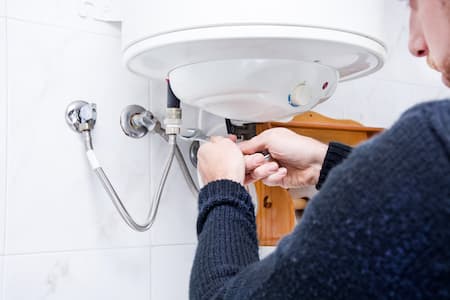Overcoming Common Water Heater Problems
Overcoming Common Water Heater Problems
Blog Article
Presented here in the next paragraph you might get more incredibly good answers related to Water Heaters Problems.

Picture starting your day without your routine warm shower. That already establishes a bad tone for the remainder of your day.
Every home needs a trustworthy hot water heater, but only a few know exactly how to handle one. One very easy means to keep your hot water heater in leading form is to look for faults on a regular basis as well as fix them as soon as they show up.
Bear in mind to shut off your water heater prior to sniffing about for faults. These are the hot water heater faults you are more than likely to come across.
Water as well hot or too cold
Every hot water heater has a thermostat that figures out how warm the water gets. If the water entering your house is also hot in spite of establishing a convenient maximum temperature level, your thermostat could be faulty.
On the other hand, too cold water may be because of a fallen short thermostat, a broken circuit, or improper gas flow. As an example, if you utilize a gas hot water heater with a busted pilot light, you would get cold water, even if the thermostat remains in ideal problem. For electric heaters, a blown fuse may be the wrongdoer.
Not enough warm water
Hot water heater come in several dimensions, depending on your warm water needs. If you run out of hot water prior to everybody has actually had a bathroom, your hot water heater is also small for your family size. You should take into consideration setting up a larger hot water heater tank or going with a tankless water heater, which occupies less room and is extra resilient.
Weird noises
There go to the very least five sort of noises you can learn through a hot water heater, but the most typical analysis is that it's time for the hot water heater to retire.
First off, you need to be familiar with the regular appears a hot water heater makes. An electrical heating unit may sound various from a gas-powered one.
Standing out or banging sounds typically indicate there is a slab of debris in your containers, and also it's time to cleanse it out. On the other hand, whistling or hissing sounds may merely be your valves allowing some pressure off.
Water leaks
Leakages might come from pipelines, water connections, shutoffs, or in the worst-case scenario, the container itself. With time, water will corrode the container, as well as find its way out. If this happens, you need to replace your hot water heater immediately.
However, before your adjustment your entire tank, make sure that all pipes are in area which each shutoff functions perfectly. If you still need help determining a leak, call your plumber.
Rust-colored water
Rust-colored water indicates among your hot water heater elements is rusted. Maybe the anode rod, or the storage tank itself. Your plumber will be able to identify which it is.
Warm water
Despite just how high you established the thermostat, you won't obtain any kind of warm water out of a heating unit well past its prime. A water heater's efficiency might minimize with time.
You will certainly additionally get warm water if your pipelines have a cross link. This indicates that when you activate a faucet, hot water from the heating unit moves in along with normal, cold water. A cross connection is easy to spot. If your hot water faucets still run after closing the water heater valves, you have a cross connection.
Discoloured Water
Rust is a significant source of unclean or discoloured water. Rust within the water tank or a falling short anode pole can create this discolouration. The anode pole safeguards the storage tank from rusting on the within and also should be checked yearly. Without a rod or an appropriately operating anode pole, the warm water swiftly rusts inside the storage tank. Get in touch with an expert water heater specialist to identify if replacing the anode pole will certainly take care of the problem; if not, change your water heater.
Conclusion
Preferably, your water heater can last 10 years prior to you need an adjustment. Nevertheless, after the 10-year mark, you may experience any one of these faults a lot more on a regular basis. At this point, you must add a brand-new hot water heater to your budget plan.
How To Troubleshoot 3 Common Water Heater Problems in Twin Cities
The Water Heater Is Leaking
A leaky cold water inlet valve A loose pipe fitting A leaky temperature and pressure relief valve A corroded anode rod A cracked tank Turn Off Your Water Heater:
Shut off your gas water heater by turning the gas valve on the unit to the “OFF” position. Shut off your electric water by switching its power off at your electrical panel. Look for a two-pole breaker labeled “water heater” and turn it to the “OFF” position. Move the ball valve connected to the water heater to be perpendicular to the piping at a 90° angle. Look for the Leak:
Depending on whether the water is coming from the tank's top or bottom, you’ll want to look for the leak in different locations.
If the leak comes from the top of the tank, carefully look for water escaping from the cold water inlet valve or loose pipe fittings. Rusted hot and cold water valves can have loose connections with the tank, with water leaking out of them.
https://mspplumbingheatingair.com/blog/how-to-troubleshoot-3-common-water-heater-problems
Hopefully you enjoyed our topic about Water Heater Repair and Troubleshooting. Thanks so much for taking the time to read our short article. Sharing is caring. You just don't know, you will be doing someone a favor. Thanks a bunch for your time. Don't hesitate to stop by our site back soon.
Trusted by locals for emergencies. Report this page